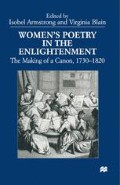Abstract
When Elizabeth Carter died in 1806, at the age of 89, her poetry was prettily eulogized as having ‘sublime simplicity of sentiment, melodious sweetness of expression, and morality the most amiable’.’ Though in the parlance of the early nineteenth century this commentary can only be read as laudatory, it also works to displace the seriousness of Carter’s poetical works. Such an implicit diminishment of poetical substance hardly seems appropriate in the case of an intellectual who had an excellent-to-working knowledge of nine languages, was renowned in her own time as the translator of the works of Epictetus, and who brought the full weight of her theological, philosophical, and literary knowledge to bear on her poetic productions.
Access this chapter
Tax calculation will be finalised at checkout
Purchases are for personal use only
Preview
Unable to display preview. Download preview PDF.
Notes
See the biographical sketch ‘Elizabeth Carter (1717–1806)’ in Roger Lonsdale (ed.), Eighteenth-Century Women Poets ( Oxford: Oxford University Press, 1990 ), pp. 165–7.
Osmond, op. cit., p. 159. For an extended discussion of this subject see Osmond’s ‘Body, Soul, and the Marriage Relationship: the History of an Analogy’, Journal of the History of Ideas, 34 (1973) pp. 283–290.
See Natalie Zemon Davis’s now classic essay ‘Women on Top: Symbolic Sexual Inversion and Political Disorder in Early Modern Europe’, in her volume of essays Society and Culture in Early Modern France ( Stanford, CA: Stanford University Press, 1975 ), pp. 124–51.
Elizabeth Carter, 20 November 1752, in A Series of Letters between Mrs Elizabeth Carter and Miss Catherine Talbot, from the Year 1741 to 1770 ed. Montagu Pennington, 2 vols (London, 1808) vol. I, p. 315. A few years earlier in a humorous mood she had written to Miss Talbot, ‘You would have been diverted in seeing how I was tormented this afternoon by insinuations of designs from a man who certainly has none, and it was mere malice, for he is the quietest and most peaceable creature that walks on the face of the earth, and has absolutely no meaning about me or anybody else; however, as I have been convinced that one is not perfectly secure on this side an hundred, it will be quite prudent in me, by way of precaution, to learn to swim; having run away from matrimonial schemes as far as dry land goes, my next step must be into the sea’ (5 May 1749, vol. I, p. 203).
Elizabeth Carter, ‘To Miss Hall’ (1746), Memoirs… with a New Edition of her Poems, vol. II, pp. 61–3.
Elizabeth Carter, ‘To Miss Ethelred Lynch’ (1747), Memoirs… with a New Edition of her Poems, vol. II, pp. 71–3.
John Gregory, A Father’s Legacy to his Daughters (1774), as reprinted in Vivien Jones (ed.), Women in the Eighteenth Century: Constructions of Femininity ( London and New York: Routledge, 1990 ), pp. 45–6.
From The Critical Review 13 (1762), as reprinted in Jones (ed.), Women in the Eighteenth Century p. 175.
Montagu Pennington, Memoirs… with a New Edition of Her Poems 2nd edn, 2 vols (London, 1808), vol. I, pp. 447–8.
Editor information
Editors and Affiliations
Copyright information
© 1999 Palgrave Macmillan, a division of Macmillan Publishers Limited
About this chapter
Cite this chapter
Freeman, L.A. (1999). ‘A Dialogue’: Elizabeth Carter’s Passion for the Female Mind. In: Armstrong, I., Blain, V. (eds) Women’s Poetry in the Enlightenment. Palgrave Macmillan, London. https://doi.org/10.1007/978-1-349-27024-8_3
Download citation
DOI: https://doi.org/10.1007/978-1-349-27024-8_3
Publisher Name: Palgrave Macmillan, London
Print ISBN: 978-1-349-27026-2
Online ISBN: 978-1-349-27024-8
eBook Packages: Palgrave Literature & Performing Arts CollectionLiterature, Cultural and Media Studies (R0)

